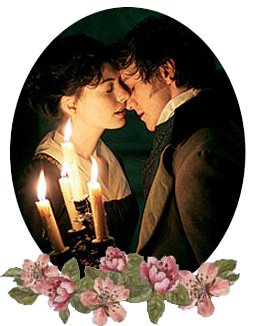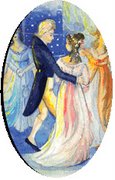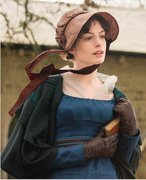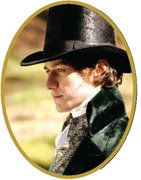Mr. Wisley vs Mr. Harris Bigg-Wither
 Becoming Jane viewers might not like John Warren who wrote the Judge the nasty letter (in fact, Warren was a pretty much decent guy who drew a sketch of Tom Lefroy and gave it to Jane Austen – letter 9 January 1796), but some viewers develop a sense of sympathy towards poor (well, rich) Mr. Wisley. I consent. I admit that I was not charmed by Laurence Fox’s Mr. Wisley during my first screenings, but then, upon watching the Husbands and Lovers scene again and again in YouTube, he somehow grew in me. Moreover, his last scene with Jane after he ditched his aunt Lady Gresham was touchy. Jane Austen and Mr. Wisley finally understood each other; they parted as friends.
Becoming Jane viewers might not like John Warren who wrote the Judge the nasty letter (in fact, Warren was a pretty much decent guy who drew a sketch of Tom Lefroy and gave it to Jane Austen – letter 9 January 1796), but some viewers develop a sense of sympathy towards poor (well, rich) Mr. Wisley. I consent. I admit that I was not charmed by Laurence Fox’s Mr. Wisley during my first screenings, but then, upon watching the Husbands and Lovers scene again and again in YouTube, he somehow grew in me. Moreover, his last scene with Jane after he ditched his aunt Lady Gresham was touchy. Jane Austen and Mr. Wisley finally understood each other; they parted as friends.
But mind you dear friends, there was no Mr. Wisley in the real Austenian landscape (nor Lady Gresham for that matter). This sensitive guy was created purposely for Becoming Jane, to be Tom Lefroy’s rival. Laurence Fox did his job well; Mr. Wisley was indeed awkward in comparison to James McAvoy’s Tom Lefroy. And when I flipped through David Nokes’ Jane Austen: a Life (1997), I was struck by another ‘awkward’ friend of Jane Austen, a real person this time. He was Harris Bigg-Wither (1781-1833), heir of Manydown Park of Hampshire.
In page 251, Nokes describes Harris as ‘tall, clumsy and awkward, he would shamble through the house, or lounge on a sofa, adding little to the general conversation.’ Caroline Austen even said that Harris was ‘very plain in person – awkward & even uncouth in manner – nothing but his size to recommend him – he was a fine big man – but one need not look about for secret reasons to account for a young lady’s not loving him.’ (Nokes, 1997, p. 258).
Well… that was Mr. Wisley to me. And the fact that in the movie Jane Austen finally accepted Mr. Wisley’s proposal for a very short time (if not hours) before she met Tom Lefroy again in the forest makes me think that perhaps Mr. Wisley’s character was inspired a bit by Harris Bigg-Wither.
Now, to Harris. As I said, he was the heir of Manydown Park, a great house in Hampshire. Jane and Cassandra befriended Harris’ sisters and often stayed in
In 1801, the Austens moved to
Except for Jane. She went to bed, but might not sleep after all. It was in Manydown in January 1796 that she danced with Tom Lefroy in such a ‘profligate’ manner. And now, almost seven years later, she accepted a proposal in the same house. But not from Tom.
We will never know Jane’s train of thought that night, it is possible that she talked with Cassandra about it. In any case, the very first thing she did the next morning was finding Harris and, again in private, cancelled their engagement. Afterwards, Jane and Cassandra simply could not stay longer in Manydown. The Bigg sisters ordered the carriage to take the Austen girls back to Steventon, where Jane later asked her brother James to take her home to
Apparently, Harris dealt with his broken heart well. On
I admire Jane Austen for her decision. She could easily succumb to the grandeur of
Nokes, D. 1997, Jane Austen: A Life, Fourth Estate, London.
Tomalin, C. 2000, Jane Austen: A Life, Penguin Books, London.
Pic 1: Jane Austen (Anne Hathaway) and Mr. Wisley (Laurence Fox), from BBC UK
Pic 2: Harris Bigg-Wither, from the Manydown site
Pic 3:













































6 comments:
Thank you! Another excellent & enjoyable post. I thought that Mr Bigg-Wither was the inspiration for Mr Wisley, but it was charming to read further details from his life. I particularly enjoyed the "shambling" quote. They used such precise language, didn't they? Just as well, because it paints an excellent picture. :)
My favourite part of the post was definitely the Manydown Park link - the fact that Jane accepted and then rejected a proposal in the very home she had once flirted with Lefroy. THAT is poignant; I love it!
I agree with you that Fox's Wisley was an interesting character who developed to reveal depth and substance. I loved the final scene between him and Jane. there was so much going on.
Regarding John Warren & "the letter", this was one of the plot developments that I disliked the most. It's difficult to state in few words, but I'll try! In the film, so much (well, everything) hinged on the Judge's acceptance of Jane as a halfway solution to the money/marriage issue. In my opinion, to effectively have Jane/Tom driven apart because of a letter written by a jealous rival was very cliché and disappointing. I think it would have made more sense to have played up family involvement rather than throw Warren (who was not THAT big a player in the film, really) into the mix with such a crucial development. I feel it trivilised the situation (sorry!) because it was such a stupid, needless letter that affected so much. More "connected" interference would've served a better end.
Just my opinion, and I still LOVE the film. LOVE the spirit of the story, love the real Tom & Jane! (They're tantalising!)
Thanks a lot, Michelle, also for the NZ Stuff link. I will fit it in the newest review.
Well, honestly, I'm not excited about the letter either. But I think that's because I've read more, and actually could see that there are more aspects they can play with, notably Mrs. Anne Lefroy's involvement.
Nonetheless, the scenes regarding the letter were touche. Tom and the Judge, particularly when Tom warned his uncle to lower his tone when speaking of Jane. That alone spoke a lot of his love. And the scene between Warren and Jane. That was sad, but funny as well.
I am rather disappointed because my book (Visitation of Ireland) has not yet arrived, hence I have to wait to post another article of Lefroy. However, Rachel might have an article soon to post (I didn't expect a daily update originally, but nowadays seem nice to have a daily update).
I'm also working on the fanfiction, so hope you will like it!
Wonderful comments! ;)
I adore the scene between Tom & the judge. Tom's defense of Jane says so much.
Equally, I love the scene that comes after. Its heart-wrenching but it shows our Jane, despite her feelings, being strong for herself and her self-respect.
James McEvoy's facial expressions when he has to be "tough" in the face of Jane (and his) dissapointment really moved me.
I will be venturing to the theater again this week. xo
Yep... I know James's performance in Atonement might deliver him Oscar (haven't seen it, of course, but the spoilers look good), but I think James' Tom Lefroy also deserves a consideration (and Anne's Jane for that matter, despite many bashings from other people...).
Take it easy, Michelle ;-) I admit it was like a cyclone when Rachel and I wrote the articles, but we are happy now that the articles are useful to the fans...
Oh, I have things to do, but I want to write my fan-fic! Help!
Here is resumed what is written about Harris Bigg-Wither and his proposal on “Jane Austen Society of Australia (JASA)” website in the article “The people in Jane Austen's life”, the sub-article “The suitor: Harris Bigg-Wither”:
http://www.jasa.net.au/japeople/biggwither.htm
Harris proposed in December 1802, when Jane was approaching her 27th birthday and Harris was 21 and Jane and Cassandra were staying at Manydown Park. Jane accepted the Harris’s proposal and there was general rejoicing in the household but early the next morning she announced her change of mind and left the house hurriedly. The probable reason was she understood (and probably got angry) that the Harris’s proposal was by his sisters’ arrangement who saw some advantages for themselves in Jane’s becoming their sister-in-law and, in due course, the mistress of Manydown Park and she considered him (according to Caroline Austen, daughter of Jane’s brother James) under her understanding as “there was nothing but his size to recommend him”. There follow some family members and biographers’ interesting and very different opinions of the Jane’s refusal.
Two years after Jane’s refusal, Harris Bigg-Wither married Anne Howe Frith. He had five sons and five daughters. One of his sons emigrated to New Zealand in 1822, and became a farmer, the other four became clergymen; the five daughters did not marry.
Harris died of apoplexy in 1833 aged 51. Many-down Park was sold, reluctantly, in 1871, and was pulled down in 1965.
Thanks a lot, Boris! Yes, we were contacted by Harris' descendant a few months ago, noticing some mistakes in other Bigg-Wither post. One of them was that the manor was always named Manydown Park, instead of Manydown House as I had thought earlier. And yes, a pity that the manor is gone now...
Post a Comment